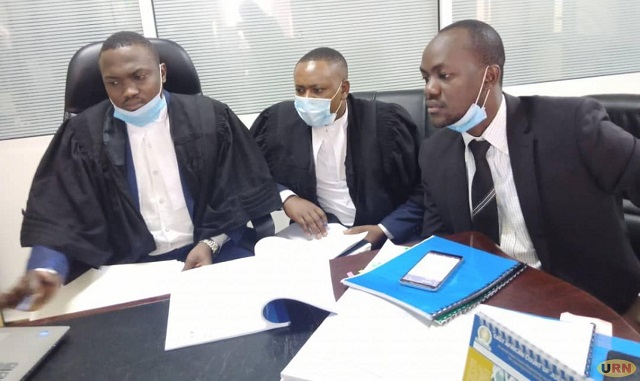
Kampala, Uganda | THE INDEPENDENT | The Appellate Division of the East African Court of Justice has issued timelines in the case in which the government of Rwanda wants to have a Rwandan Judge on the panel of judges hearing the matter challenging its decision to close the Ugandan border.
The matter arises from a case filed by a Ugandan lawyer Steven Kalali in April 2019 challenging the February 27, 2019 actions of the government of Rwanda to close its Kyanika and Gatuna borders, blocking trucks from Uganda to allegedly expedite construction works at the Rwandan side of the Gatuna border.
Following the closure, Kalali through his lawyers Richard Wananda, Joseph Mutyaba and Josephat Mutesasira petitioned the First Instance Division of the East African Court of Justice arguing that the actions of Rwanda by closing its border have infringed on the rights and freedoms of its people, and those in neighboring countries.
Kalali added that Rwanda’s actions have since caused financial loss to hundreds of traders. He thus demanded an order from the court declaring the border closure illegal and that it contravenes the East African treaty which Rwanda is a signatory.
However, as the case was pending judgment at the First Instance Division, Rwanda in August 2020 filed an application seeking to halt these proceedings until a full bench of the East African Court of Justices is constituted due to the alleged complexity of the matter.
According to the affidavit of the Acting Head of Legal Services in the Ministry of Justice of Rwanda, Emile Ntwali, they wanted all the Judges of that court to preside over Kalali’s case because the matters that he complained about involve many complex laws, legislation, practices and principles.
“That I have read the content in this notice or motion filed by the applicant seeking that reference number two of 2019 pending before this Honourable Court an application number six of 2020 arising from it therein; be heard and determined by the full bench after the appointment of a Rwandan Judge by the summit,” reads the affidavit.
But in the aftermath, the three judges of the First Instance Division including Principal Judge Monica Mugenyi from Uganda, Audace Ngiye from Burundi and Dr Charles Oyo Nyawello from South Sudan dismissed the application on grounds that it lacked merit. They also asked the government of Rwanda to pay costs to Kalali.
But Rwanda’s Attorney General appealed before the Appellate Division of the East African Court of Justice saying that the learned Justices of the First Instance Division erred in law by condemning them to pay costs and denying that the case was not of immense public importance, complex and entailing conflict of laws.
They asked the court to quash the ruling and make an order that Kalali’s case is of immense public importance and involved many complex laws and legislations, practices and principles and therefore be determined by a full bench of five Judges as per the East African Court of Justice Practice.
The appeal is supported by the Acting Head of Legal Service in the Ministry of Justice of the government of Rwanda Emile Ntwali who says the East African Summit needs to appoint a Rwandan Judge onto the panel for the case hearing to move on.
However, when the matter came up on Tuesday for scheduling, the Justices of the Appellate Division led by Vice President Geoffrey Kiryabwire gave the parties the timelines within which to follow to make submissions on the issues that they want the court to determine.
Rwanda has now been given up to June 24th 2021 to file their submissions and Kalali who is the respondent given up to 9th July 2021.
The Judges have also directed that if there is any rejoinder, it should be made by July 19th 2021 and the hearing of the appeal will be on notice.
But while commenting on Rwanda’s request, Kalali said the request is untenable because such applications can always be heard by one Judge and they were reportedly lucky that it was determined by three Judges of the First Instance Division of the East African Court of Justice.
Kalali added that Rwanda is abusing the court process because courts constitute panels based on competence, resources and the Principal Judge’s discretion but not on nationalities.
The Mediation talks between Uganda and Rwanda over the border closure suffered a huge setback in 2020 due to the Covid-19 pandemic.
Rwanda accused Uganda of supporting rebel groups opposed to President Paul Kagame’s government.
*****
URN
The post Court issues timelines in Rwanda-Uganda border closure case appeared first on The Independent Uganda:.
from The Independent Uganda: https://ift.tt/3vnWFOV


0 Comments